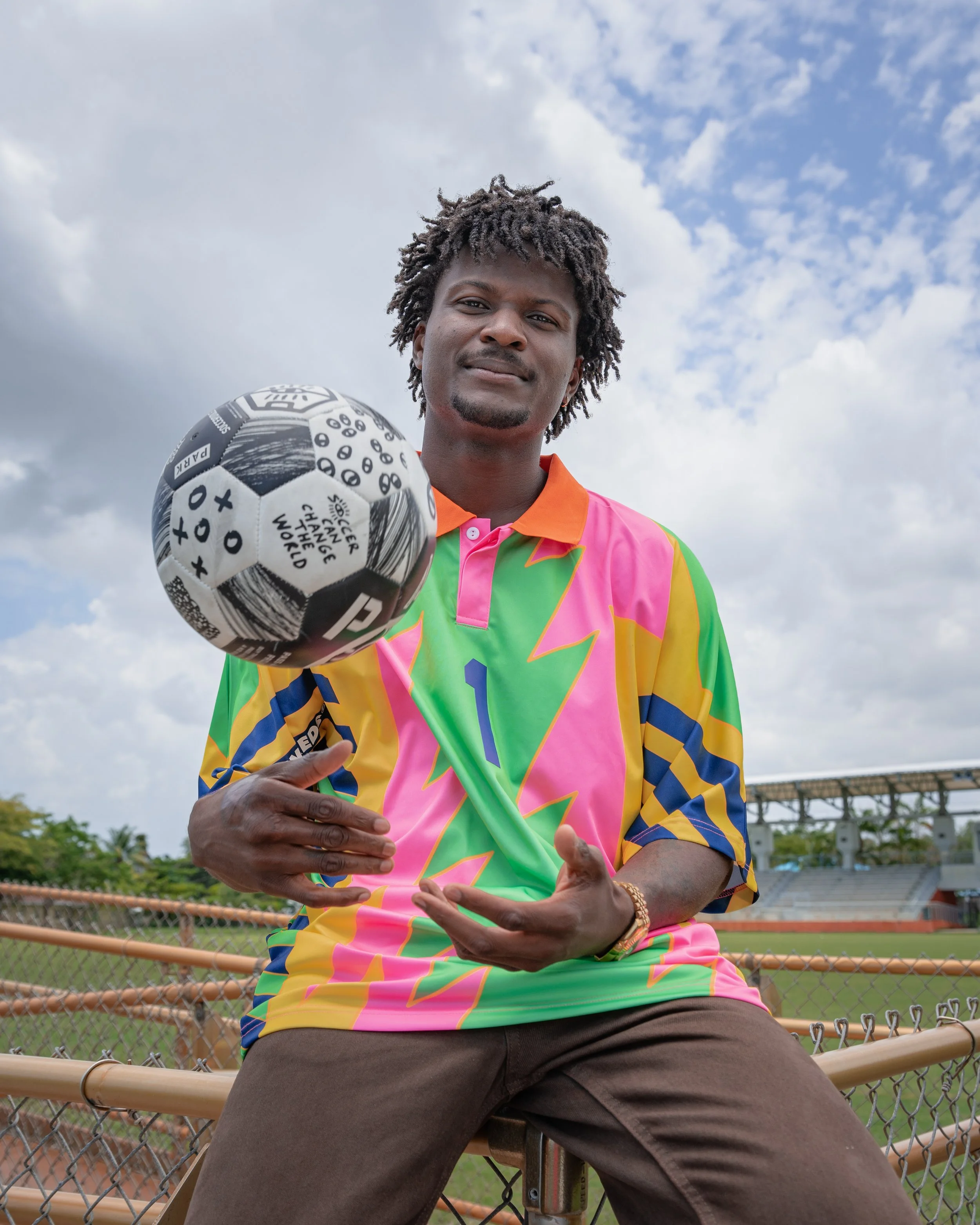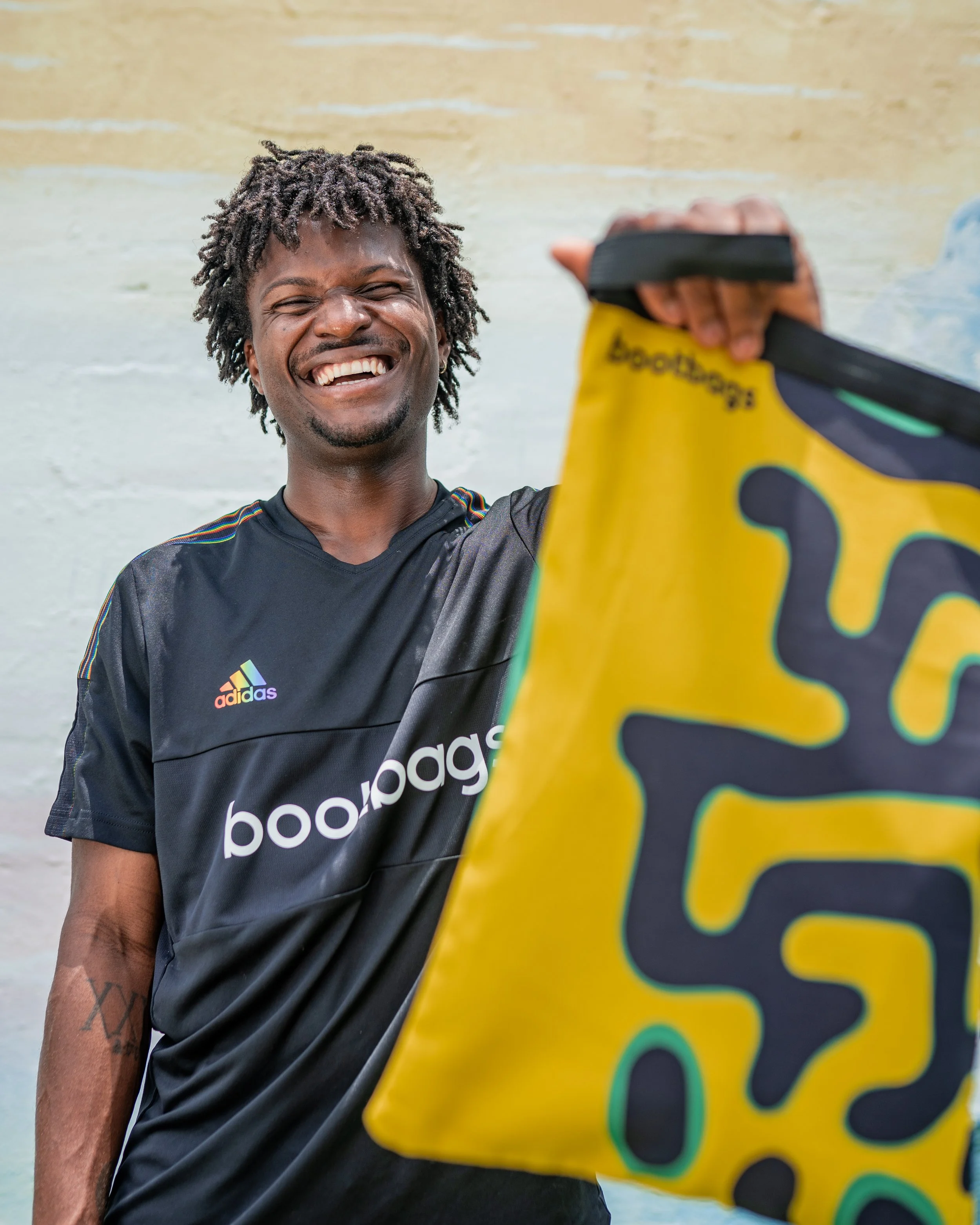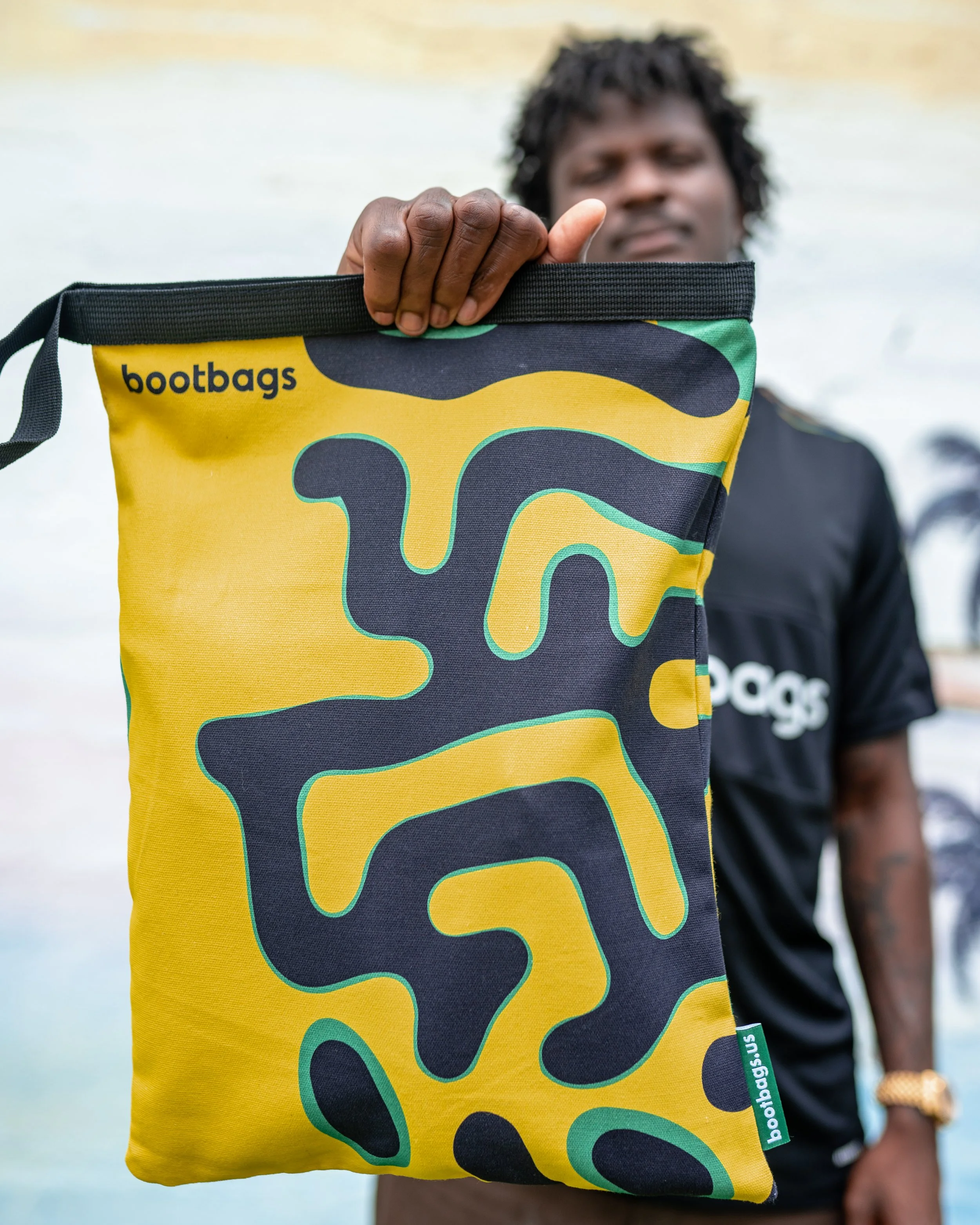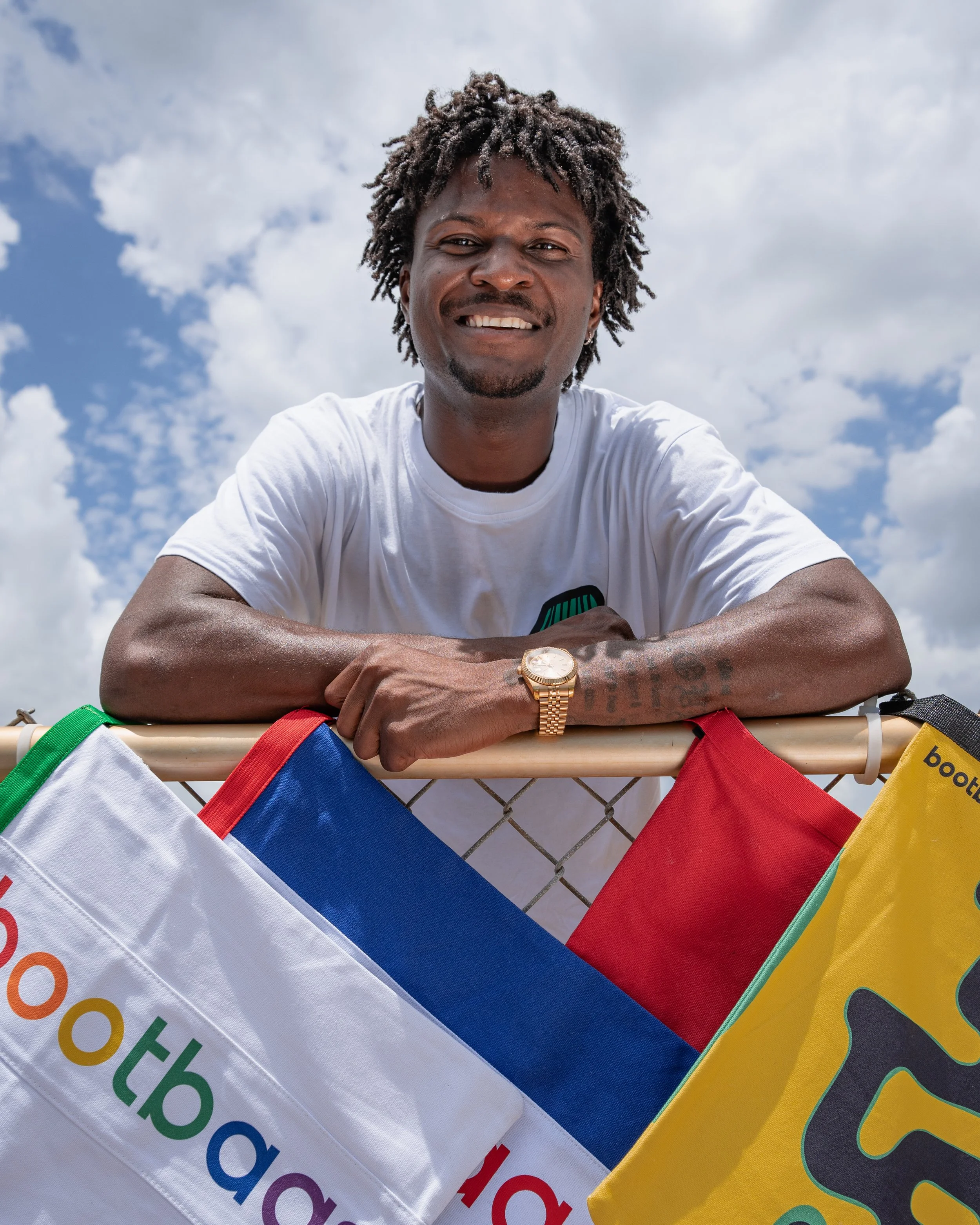Shane Malcolm

Photography by Carlo Rojas.
He’s changing the world one boot bag at a time. After moving to the United States as a kid, Shane Malcolm built himself a professional career through pure grit. And while he’s been successful on the field, one of his most significant accomplishments in the sport has been creating bootbags, a company connecting sports to fashion, and a charity that is dedicated to giving cleats to kids in underdeveloped communities.
While bootbags was only founded in 2019, Shane’s and the company’s story really began decades ago in Jamaica.
“I remember growing up in Jamaica playing with my friends at lunchtime,” he says. “We would grab empty bottles of Coke, fill them up with sand and just play with them.” Those experiences not only served as an introduction to the beautiful game, but they also made an impression on Shane that would eventually lead him to found bootbags years down the road.
While Jamaica saw Shane take his first steps with soccer, Shane and his family would end up moving to the United States when he was only nine. Here, he began taking his first formal steps in the sport.
“We had just moved, and we saw a team practicing at our local park. My mom asked the coach if I could be involved, and I joined the team. I sat on the bench for two years, but I didn’t miss a day of practice. Those two years were crucial because they brought me up to speed in terms of technical abilities, which I hadn’t developed up until then.”
Soon enough, Shane began growing in confidence and quickly rose up the ranks. He breezed through his club team, the state team, and the region team at ODP. Despite his rapid rise, the idea of playing pro never really crossed his mind.
“I did not have any idea of playing pro. I didn’t even have the idea of going to college,” he admits. “It wasn’t something that I’d seen in my family, so I didn’t necessarily have a lot of representation.”
As a result, much of his climb through both the soccer and academic ladder was self-led.
“It was all very self-guided. I rode my bike to practice, took city buses, and I caught rides with other families for out-of-town trips. I’d also have to raise my own money most times for some trips, so my path was a little bit more independent. Still, I didn’t have any idea that I would play professionally until I got to college.”
On top of that, getting to college was also a path that Shane never imagined he’d be able to take either. Despite being student body president and having multiple colleges reach out, being a first-generation immigrant posed challenges for Shane when navigating the application process.
“I was student body president at the time, and I was very involved in organizing community activities, which is funny because I feel like that’s what I do now in my adult life. But even though I was student body president, I didn’t know anything about navigating the college application process. I had piles of college letters and emails, but I didn’t know what to do. Eventually, I just started reaching out to coaches and sending emails just to see if I could connect with anybody. I got offers from FIU, the University of South Florida, and UCF to maybe go play soccer. But I eventually chose to go to High Point University in North Carolina because of the coach and the campus. It ended up being the best decision because I got a scholarship and good development thanks to my coaches and fellow players.”
After a solid development at the collegiate level, Shane finally tried his luck at following his dream of playing professionally. In college, he had been called up to the Guamanian National Team, which opened up a few windows for him to play abroad.
“I was playing for Guam and had a good showing in a match against Singapore,” Shane remembers. “My agent brought me over to Malaysia directly afterward, and I had a few trials. Unfortunately, the trials didn’t work out, and by that point, I only had $350 to my name. I didn’t have many options, so I just went to Australia to try my luck. I had a series of trials, and I impressed, but I wasn’t going to be able to get my citizenship right away, so I ended up getting referred to a third-division team called Ashfield Sports Club. That’s how I was able to get started.”
From there, Shane embarked on a journey across many leagues from around the globe, which would ultimately play a part in his inspiration to start bootbags.
“The inspiration behind bootbags came to me in Japan in 2018. I was playing with the Guam National Team, and I saw some kids that just rocked up to the park we were training at. These kids had homemade cotton bags to keep their shoes in, and the bags were so intricate and colorful. At that point, I just thought, ‘how cool would it be to bring this to the States?’ You could really make any texture, form, or style with it.”
While the original idea came to Shane in 2018, it would take a few more experiences around the globe to flesh out the project.
“I was really interested in storytelling at the time, and I was doing video interviews with players from other teams I would face. I was really into video, and I got invited to film an adoption in China. I did the filming and decided to stay behind to chat with potential suppliers over there. Those conversations eventually made founding bootbags a reality.”
After much fine-tuning alongside his good friend Jordan Schweitzer, bootbags officially launched in 2019, and for every five bags they sell, they give a pair of new or lightly used boots to a child in need.
“After a few years, I think we’ve really found our space in this crazy soccer market. We chose an accessory that was kind of slept on in many ways. It’s so simple, and many people don’t have one – the lower-end cleats don’t usually come with one. It’s one of the few things you can have in soccer to show your personality. All kits are the same, but everyone gets to choose what cleats they wear. In that vein, it makes sense that your boot bag should be an expression of yourself too.”
At first, Shane enlisted the help of his grandma to string up some prototypes, and from that first bag, they haven’t looked back. After redesigning and improving the initial prototype, bootbags was ready to hit the market, and they haven’t looked back since. Since 2019, they’ve continued to expand, enlisting the help of a former Nike product designer, partnering with Football for the World, and adding seven volunteers to help with their projects.
Outside of designing unique bags and running regular operations, bootbags is also taking great initiative to give back to communities all over the globe. This latter mission is perhaps the company’s most noteworthy feat.
“We understand that soccer has the power to bring people together, and it’s also a great catalyst for change. I really wanted to have bootbags be a vehicle for change because giving back has been something that’s always been important to me since I was a kid. Growing up in Jamaica, I had a nanny and everything, and then when I moved to the United States, I lived in a low-income community. I’ve seen both sides of things, and it’s made me passionate about trying to help give people as many resources as possible.”
One of those resources has been cleats. “We have shipped boots to about 27 countries now, and we understand that cleats are the most expensive resource to get involved in the game,” reflects Shane. “At the high end, it can be $300, and at the low end, it can be $80. That’s a lot of money to invest to develop into the best player you can be. We want to do our part in offsetting that cost and creating a more equitable space for kids to participate.”
While donating cleats has been a staple for bootbags throughout the years, they have also started solidifying other projects with communities worldwide.
“This year, we organized going to Jamaica to do our give-back program. This was the first year of our pilot, and we have a five-year plan in place whenever we interact with a community. The first five years are all about building relationships within the community and identifying their needs. In terms of providing resources for these communities, it’s not all about cleats. More than anything, I recognize that there’s a big gap when it comes to access to education, for example, and we want to find ways to partner with communities to help improve those other areas. After this first year in Jamaica, for example, we’re looking at designing backpacks for children in those communities. We just want to help in whatever way we can while keeping the needs of the communities in mind.”
These past few years have not only been positive in terms of helping communities far and wide, but they’ve also helped Shane step into an important role beyond the soccer pitch. From dabbling in designing to dealing with manufacturers at late hours of the night to fleshing out a sustainable business model, Shane has had his hands full. Still, it’s not only resulted in perhaps the most creative boot bag company on the scene today but it’s also spawned a vehicle for change.
As for what’s next for Shane, his story on the field is not done, and bootbags is only getting started.
“I’m looking forward to joining more Guam National Team camps before the end of the year,” he says. “As for bootbags, we’re sustainable enough now to stand on our own while still providing the needs that we set out to meet for other communities. Our goal now is to expand, hire our first full-time employee, and hopefully increase the amount of work we can do across the globe.”
Make sure to check out bootbags here, and see how you can be part of the change.
Photography by Carlo Rojas.









